Supporting the Next Generation: Insights from Emerging Scholars of Faith & Giving
Supporting the Next Generation: Insights from Emerging Scholars of Faith & Giving
In this Issue:
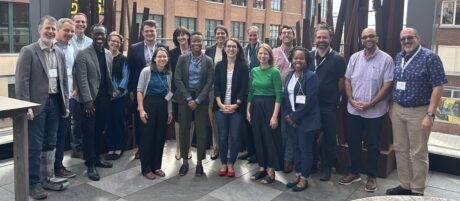
2024 LINES emerging and senior scholars and Lake Institute staff at the conclusion of the two-day gathering in Indianapolis.
Here at Lake Institute, we are growing the scholarly conversation on religion and philanthropy. To this end, we recently hosted 17 scholars – 11 of whom are in the first decade of their career, and six of whom are more seasoned scholars – in Indianapolis for a two-day gathering as part of the Lake Institute Network of Emerging Scholars (LINES). Emerging scholars representing a diverse set of disciplines presented their research projects at the intersection of faith and giving and received feedback and questions from senior scholars and peers alike. In addition, researchers had opportunities for larger discussions on the broad and evolving field of faith and giving. We were thrilled to host such a brilliant group of people who were eager to learn from one another and dig into difficult questions so that they might, through their research, offer the larger community and practitioners a more robust understanding of how faith informs and inspires giving.
We asked three emerging scholars about their experience at LINES:
Q: How did participating in LINES affect your approach to research on faith and giving?
Dr. Shaunesse’ Jacobs Plaisimond, Assistant Professor of Religion and Health, University of South Florida: Participating in LINES birthed a new area of research for me that neatly intersects with my ongoing research agenda. I have been able to expand and deepen some of my questions on religion and health among marginalized communities by including research perspectives on faith and giving. This expansion and depth have also allowed me to clarify my analytical lens for my health communities of concern to better understand more obstacles they face in achieving full health equity. Now that I am including the philanthropic role in religion and health into my research agenda, I have gained new and enriching conversation partners to sharpen my holistic healthcare and health policy lens.
Dr. Megan Pontes, Assistant Teaching Professor, School of Community Resources and Development at Arizona State University: Participating in LINES affected my approach to research on faith and giving through inspiring connections and collaborations. The benefits that come from interdisciplinary exchanges were evident – the knowledge and insights that each emerging and senior scholar brought from their field and experience was stimulating and positively challenged me. I left invigorated by the innovative potential collaborations for future research and excited to explore areas of the field that previously I had not seen as connected to my research.
Dr. Adina Bankier-Karp, Research Affiliate, Australian Centre for Jewish Civilisation at Monash University: Participating in LINES broadened my perspective on researching faith and giving. As a social scientist focused on identity formation, I had previously viewed philanthropy within a narrow Australian context, treating it as one factor among many. Engaging with US-based scholars, where culture, taxation, race, and religious diversity shape giving practices, offered me fresh insights into Australia’s philanthropic landscape. I now better grasp the complex interplay between philanthropy and various structural factors, recognizing the importance of comparative research in understanding how societal contexts influence charitable behaviors. The experience profoundly enriched my understanding.
Q: How did you see the field of faith and giving grow or evolve through LINES?
Dr. Pontes: I see the field of faith and giving growing and evolving through LINES through the broader conversations that began and are continuing around the concepts of generosity and giving. As we continue to explore and disaggregate the changing definitions and interpretations of words such as generosity and philanthropy, it challenges both researchers and practitioners to ask what we are not measuring. What remains to be explored of how individuals and congregations understand and practice generosity and giving in the context of faith?
Q: How do you understand the field of faith and giving differently after participating in LINES?
Dr. Bankier-Karp: LINES expanded my understanding of faith and giving, introducing me to a wealth of interdisciplinary research and a cadre of remarkable scholars. I now appreciate the significance of structural factors in shaping a country’s philanthropic ecosystem. This includes supporting faith leaders in fostering cultures of giving, capitalizing on digital giving’s benefits, and employing strategic innovations like linked grants and repurposing religious properties for social causes. These examples underscore pathways to maximizing faith-based philanthropy’s impact. This experience truly deepened my perspective.
Q: What is one insight from the exchanges between senior and emerging scholars that has stuck with you?
Dr. Jacobs Plaisimond: The most important insight I gained was the sense of camaraderie that focused and engaging exchanges between senior and emerging scholars can create. Each senior scholar shared constructive feedback with such kindness and respect. Their examples left a beautiful impression on me and have been a guide as I engage with my students and research assistants. Their examples also allowed us as emerging scholars to better hear their feedback and sharpen our insights, leaving the LINES cohort stronger and more grounded in our new research agendas.
Expanded Perspective: The Transformative Power of the LINES Experience
By Dr. Allison Youatt Schnable, Paul H. O’Neill Professor, Indiana University, Bloomington
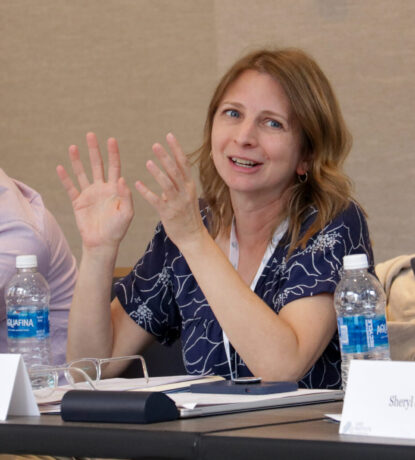
The great success of the LINES gathering this fall was in some sense unlikely. It is no small feat to create a coherent scholarly conversation on the themes of faith and giving among researchers who vary widely in their interests, their own religious commitments, and their academic disciplines. Yet in scholarship from across the social sciences and humanities, themes emerged:
- How should religious organizations consider inequality—especially histories that implicate their own organizations in creating that inequality—in managing their giving?
- How will philanthropy change as religious participation declines in the United States? How does religious identity shape generosity among minority groups?
- And what is the interplay between religion and some issues that seem poignantly of-the-moment (but historians remind us, are not new): political polarization, racial tension, and the “scam” economy?
For me, participating in LINES was a particular joy because of my history with Lake Institute: I was a lucky recipient of the Lake Institute Dissertation Fellowship in 2012, and this year was invited to LINES in the role of “senior” scholar. (During the workshop we quickly concluded that the line between an “emerging” scholar and a “senior” one was vague indeed). Having been both a junior and senior participant in Lake Institute programs, I can appreciate three ways that LINES builds the scholarly field.
First, it provides emerging scholars with high-quality feedback on their work from an engaged and diverse audience. I was reminded of the importance of seeing the possibilities of projects in their early stages rather than simply trying to address problems, as scholars are typically forced to do once projects are in front of reviewers. Second, LINES lives up to its eponymous promise: it creates a network. New connections were made in Indianapolis, old professional friendships were renewed, and many of us were delighted to meet in person scholars whom we’d known only by their work. Finally, it gave scholars two uninterrupted days to do nothing but engage with the ideas of faith and giving. I’m reminded of Simone Weil’s comment that “attention is the rarest and purest form of generosity.” The LINES gathering, then, was not just a study of generosity but an enactment of it.
Meet the 2024 Lake Doctoral Dissertation Fellowship Recipients
The Lake Doctoral Dissertation Fellowship is a one-year grant awarded annually to support a graduate student in their final year of dissertation writing. Focused on research that explores the intersection of religion and philanthropy or faith and giving, this fellowship aids doctoral candidates at U.S. graduate schools. Applications for 2025 scholarships are now open.
The Lake Doctoral Dissertation Fellowship not only supports emerging scholars but also celebrates their impactful research contributions. As we look ahead to the 2025 application cycle, we invite you to get to know the 2024 recipients who are making significant strides in their fields:
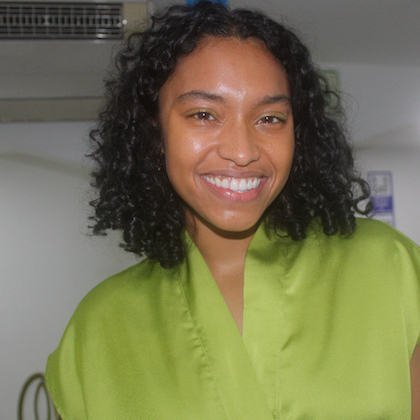
Mélena Laudig is a PhD Candidate in Religion at Princeton University, where she is also pursuing certificates from the Department of African American Studies and the Program in Gender and Sexuality Studies. Her dissertation project, “‘Her Country’s Children’: African American Religion and Childhood in Slavery and Freedom,” examines how religious communities, institutions, and cultures shaped the experiences of Black American children during the long nineteenth century. She earned a Master of Arts in Religion from Princeton University and a Bachelor of Arts in Religious Studies from Yale College.
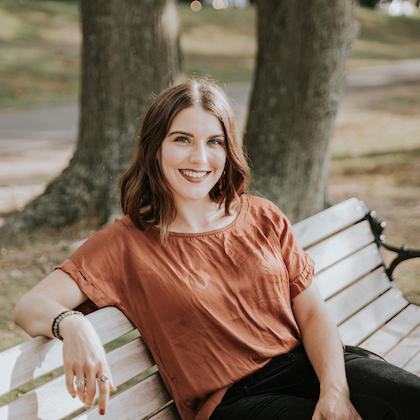 Hannah Grace Howard is a PhD Candidate in Sociocultural Anthropology at Boston University. Broadly, her research concerns the evolving, and sometimes unexpected, social and political action of Orthodox Christians in places where the national, the ethnic, and the religious have long been braided together. Her dissertation, “Liturgical Care: Theological & Political Belonging in Athenian Greek Orthodox Charity,” specifically explores a puzzling fact: in the humanitarian aid-saturated context of Athens, the Orthodox Church of Greece continues to offer highly local, unscalable aid in the form of food provision, shelter, and direct monetary handouts to both Greek and migrant individuals and families. She argues that this is part of a unique ethos of care that devout Orthodox women and priests practice as part of a pious selfhood distinct from the notion of a volunteering citizen seen in secular humanitarianism. Hannah looks forward to finishing her dissertation with the support of Lake Institute and continuing her career as an educator.
Hannah Grace Howard is a PhD Candidate in Sociocultural Anthropology at Boston University. Broadly, her research concerns the evolving, and sometimes unexpected, social and political action of Orthodox Christians in places where the national, the ethnic, and the religious have long been braided together. Her dissertation, “Liturgical Care: Theological & Political Belonging in Athenian Greek Orthodox Charity,” specifically explores a puzzling fact: in the humanitarian aid-saturated context of Athens, the Orthodox Church of Greece continues to offer highly local, unscalable aid in the form of food provision, shelter, and direct monetary handouts to both Greek and migrant individuals and families. She argues that this is part of a unique ethos of care that devout Orthodox women and priests practice as part of a pious selfhood distinct from the notion of a volunteering citizen seen in secular humanitarianism. Hannah looks forward to finishing her dissertation with the support of Lake Institute and continuing her career as an educator.
New on the Faithful Generosity Story Shelf: A Farm & A Seminary’s New Identity
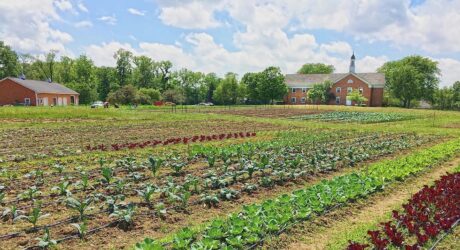 A seminary in Ohio has combined its theological teachings with environmental concerns to feed the body while nourishing the soul.
A seminary in Ohio has combined its theological teachings with environmental concerns to feed the body while nourishing the soul.
The Faithful Generosity Story Shelf, powered by Lake Institute on Faith & Giving, highlights congregations and religious organizations who have sought to use their assets and resources in creative—and sometimes surprising—ways as an expression of faithful giving
Subscribe
Insights is a bi-weekly e-newsletter for the religious community and fundraisers of faith-based organizations that provides:
- Reflections on important developments in the field of faith and giving
- Recommended books, studies and articles
- Upcoming Lake Institute events
